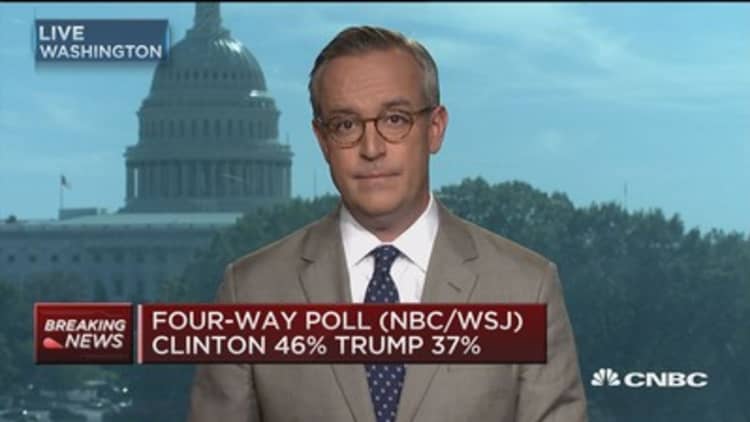
Donald Trump is directing an onslaught at the Republican Party even as his unconventional campaign relies heavily on the GOP to reach voters.
Trump in a series of tweets Tuesday called Republican House Speaker Paul Ryan a "weak and ineffective leader" and labeled the GOP "disloyal." It followed Ryan's statement Monday that he will focus on keeping congressional majorities, not getting his party's presidential nominee elected, in the wake of a leaked 2005 video in which Trump joked about groping women without consent.
Candidates and political parties typically have a close relationship in mobilizing voters in the weeks leading up to Election Day. So far, Trump's campaign and the GOP have raised money together, while the national GOP and state party fueled "get out the vote" efforts like ground staff and direct mail and phone programs.
The Republican National Committee has given no indication that it will cut off Trump's resources, despite it temporarily halting its direct mail. RNC Chairman Reince Priebus told the party's members Monday that the "RNC is in full coordination with the Trump campaign and we have a great relationship with them."
Still, Trump's fundraising and outreach efforts in swing states could suffer in the wake of his spat with Ryan and Republicans, said Katie Packer, a Republican strategist at Burning Glass Consulting and former deputy campaign manager for Mitt Romney's 2012 presidential run. Trump got to this point while spending considerably less on television ads and ground staff than presidential campaigns typically do, relying on the GOP for many crucial resources.
Waning Republican Party support certainly will not help Trump to win voters in an election in which he has devoted minimal resources to ground staff. But as long as the gap between Democrat Hillary Clinton and Trump stays wide and the Trump campaign fails to pin down a consistent message about Clinton, the GOP's support for Trump may not matter at this point, Packer said.
"I don't think he's going to lose because of a lack of money in television ads. They don't have a coherent strategy to define their opponent. They haven't spent anywhere near the resources necessary on get out the vote programs," she said.
It will likely prove difficult for Trump to claw back from his current polling hole against Clinton without the Republican Party's full support. An NBC News/Wall Street Journal poll shows Clinton with a 9-point lead over Trump following the second presidential debate and the leak of a 2005 video that shows Trump joking about groping women without their consent. Recent polls in most key swing states also favor Clinton.
At the end of August, pro-Clinton forces had a 5-to-1 paid staff advantage to Trump's election effort, according to NBC News. The Clinton campaign employed 800 people working to elect her, while the Democratic National Committee had 400 and state parties had 3,000 in 13 battleground states.
The Trump campaign employed 130 people on the ground, with 270 for the Republican National Committee and 480 at the 13 state parties. Trump's campaign paid for half the people on the ground that the national party did. Clinton's paid for double the number her national party did.
On the plus side for Trump, many state party officials have shown more fervor defending him than those on the national level. Diana Orrock, Republican national committeewoman from Nevada, told CNBC's "Power Lunch" on Monday that she "will not support any candidate who is not supporting and endorsing the party's nominee."
Other state party officials have expressed similar sentiment since lawmakers began shying away from Trump.
As for fundraising hurdles from his fight with Republicans, Trump may not take an enormous hit at this point if he spends the way he has for most of the race. At the end of August, the most recent month data is available, the Trump campaign had $50.3 million on hand after spending less than $30 million during the month. Clinton's campaign spent nearly $50 million in August. In August 2012, President Barack Obama and Mitt Romney's campaigns spent about $84 million and $66 million, respectively.
Its cash pile may have grown in September as the polling gap between the two candidates tightened. The Trump campaign will not report its September finances to the Federal Election Commission until Oct. 20.


